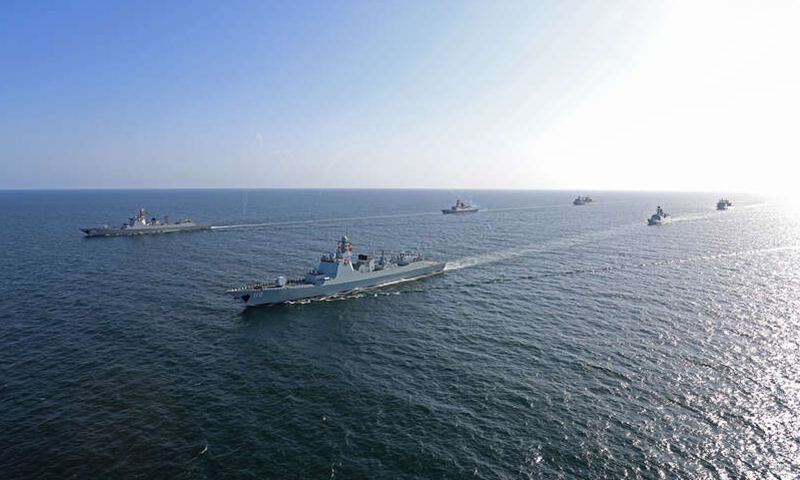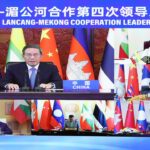China is set to celebrate the 15th anniversary of its overseas naval escort missions on Tuesday, through which the country has been contributing to global peace and stability with concrete actions amid its shift in naval strategy from near seas defense to far seas protection, experts said.
Under relevant resolutions by the UN Security Council, the Chinese People’s Liberation Army (PLA) Navy deployed its first task force to carry out escort missions in the Gulf of Aden and waters off Somalia on December 26, 2008.
Since then, the PLA Navy has made about 150 vessel sorties and sent over 35,000 officials and soldiers on 45 escort task forces, and made 1,600 escort runs protecting more than 7,200 ships, over 50 percent of them from foreign countries, in pirate-infested waters, according to authorities.
One of the main goals of the Chinese naval escort missions is to protect the safety of passing ships and personnel in the Gulf of Aden, a busy sea lane in the heart of world trade that sees tens of thousands of ships from over a hundred countries annually commuting between Europe and the Pacific Ocean region as well as the Indian Ocean region, Zhang Junshe, a Chinese naval expert, told the Global Times on Monday.
China’s sending of warships to provide escorts in this pirate-infested region not only safeguards China’s national strategic interests, but also fulfils its international responsibility and obligations by providing public security goods to the international community, Zhang said.
Through the joint efforts of navies around the world, pirate attacks in the Gulf of Aden and waters off Somalia have significantly decreased compared with 15 years ago, but pirates still remain in the region, as they have developed new methods of attacks farther away from the coast of Somalia into the Arabian Sea, so naval escorts are not only still necessary, but also need to expand and adapt, Zhang said.
Observers pointed out that the PLA Navy’s escort route, starting from China’s coastal regions, stretching from the South China Sea into the Indian Ocean and the Arabian Sea before arriving in the Gulf of Aden and waters off Somalia, is also China’s maritime trade and energy lifeline, and with the China-proposed Belt and Road Initiative, more Chinese overseas interests including Chinese personnel, investments and cooperation projects need to be protected along the route.
PLA Navy escort task forces have also carried out three missions involving evacuation of nationals during their escort missions – in Libya in 2011, in Yemen in 2015 and in Sudan this year.
In the evacuation operations, the PLA Navy not only evacuated Chinese nationals, but also foreign personnel.
Fifteen years of escort missions also witnessed the development of the PLA Navy’s far seas capability, analysts said.
The first task force in 2008 was led by the Type 052B destroyer Wuhan, and now the main destroyers in recent task forces are of the Type 052D, which experts said are significantly more modern and powerful.
A typical escort task force nowadays consists of a Type 052D destroyer, a Type 054A frigate and a Type 903/A comprehensive replenishment ship, an all-round combination that enables coordination, support and rotation in far seas, experts said.
In 2017, the PLA established its first and currently only overseas base, the PLA Support Base in Djibouti, which is very close to the Gulf of Aden and waters off Somalia.
This allows the PLA naval escort task forces to better receive supplies, Zhang said, noting that at the start, the escort vessels could only carry their own supplies, but now have the additional option of getting port replenishments.
From another perspective, the PLA Navy’s escort missions marked the implementation of its strategic requirements of near seas defense and far seas protection, as the PLA Navy strides to form blue-water capabilities, another Chinese military expert who had boarded a PLA vessel in a previous escort mission told the Global Times on Monday, requesting anonymity.
Before the early 21st century, the PLA Navy had barely any far seas capabilities, with its strategic focus being solely on near seas defense, the expert said, noting that with China’s development in its comprehensive national strength, the country needs to enhance its far seas protection capabilities in deep blue waters to safeguard its development interests as well as to shoulder its growing international responsibilities and obligations.
The PLA Navy will continue to carry out escort missions to contribute to global peace and stability as well as promote the building of a community with a shared future for mankind and a maritime community with a shared future, the expert said.
(Global Times)




